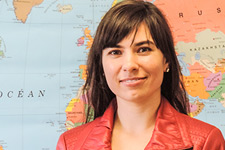Language has been her passport to life
By Jason Winders, MES'10, PhD'16

For most of us, Lucie Bartosova’s dreams would require subtitles.
Bartosova, BA’03, BEd’07, MA’09, has a mind for language – she was born into Czech, quickly learned English, started French in Grade 3, Spanish in high school and German in university, and then, through friends, picked up Polish. She sharpened each language outside the classroom with study-abroad opportunities.
An advocate for language education, Lucie Bartosova, BA’03, BEd’07, MA’09, works as a project manager for the Centre for Canadian Language Benchmarks.
In her head, she does not convert her thoughts from English; she thinks in the language she is speaking at the moment. Unless she needs to count – that’s in English. Or curse – that’s in Czech.
“When you dream in a language, you’re on the right track. My mind works that way,” she said. “It helped I started so young, when my brain was a sponge. Right off the bat, I had the two languages – Czech and English. That helped me learn tricks and easier ways to pick things up.”
For Bartosova, her love of language led her to a career in offering the same opportunity to experience the world through different voices.
Last year, she ran Explore, a five-week intensive language-immersion program sponsored by the Council of Ministers of Education, Canada. More than 20 institutions across Canada offer Explore, including Western’s French Immersion School in Trois-Pistoles, Quebec. The locations provide a unique program – for cohorts ages 16-17 and 19 and up, or both – with a different set of activities and workshops.
Bartosova, a two-time alumna of the Explore program, went on to work as Ottawa campus director for the Centre Linquistique at the Collège de Jonquière in Quebec.
“Without sounding a bit corny, this program can expand horizons,” she said. “It allows you to expand your social realm – not just perfect your language skills. Because many of the participants have never been away from home, they learn a lot about themselves – about what they are good at, what they need to work on.
“I did both – the teenager group, and the older group. I met a lot of people. In the older group, a lot of them were immigrants. They got to learn about a different city, different customs. The younger ones learned about what it means to be in a multi-cultural setting; they had exposures to these different cultures. The program benefits all around.”
While she is not involved with Explore this year, Bartosova continues to preach the unique power of languages to change lives. In her life, languages have meant connections to other people and to other cultures – which has proven its worth time and time again.
“Some people are great at numbers; some people are great at business; I excel at languages. I encourage students, if you have the opportunity, do a program abroad; take a language. It will be about more than just a language,” she said.
Today, Bartosova works as a project manager for the Centre for Canadian Language Benchmarks, the centre of expertise in support of the national standards in English and French for describing, measuring and recognizing second language proficiency of adult immigrants and prospective immigrants for living and working in Canada. In this position, she manages federally and provincially funded projects focused on teacher training and professional development, as well as resource development for language instructors.
“Languages open your eyes to new cultures. You can connect,” she said. “Thanks to my different language skills, I connect with people better socially. I am more tolerant of people from different backgrounds, different cultures. That is for me, personally. I am now curious and open to meeting new people.
“When we have a common language, we can have a common goal. And that brings people together.”

